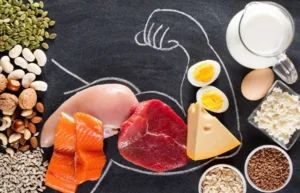Learn how much protein you need each day, how to calculate your daily protein intake, the factors that affect your protein requirements, the negative effects of too much protein, and what foods and supplements are good sources of protein.
Protein is an essential nutrient that our body needs to function properly. It is important for building and repairing tissues, producing enzymes and hormones, and supporting our immune system. But how much protein do we actually need each day? In this article, we will explore the recommended daily protein intake, factors that affect protein requirements, protein quality and absorption, and the negative effects of consuming too much protein.
What is protein?
Protein is a macronutrient made up of amino acids. Our body uses 20 different amino acids to build and repair tissues, and to carry out various functions in our body. Some amino acids can be produced by our body, while others need to be obtained from our diet.
How to calculate your daily protein intake
Calculating your daily protein intake can be done by following a simple formula based on your body weight and activity level. Here’s how to calculate your daily protein intake:
- Determine your body weight in pounds. For example, if you weigh 150 pounds, this is the number you will use in the calculation.
- Multiply your body weight in pounds by 0.8 to determine your minimum daily protein intake. For example, if you weigh 150 pounds, your minimum daily protein intake would be 120 grams (150 x 0.8).
- Adjust your protein intake based on your activity level. If you’re physically active, you may need more protein to support muscle growth and recovery. In this case, you can multiply your body weight in pounds by 1.2 to 1.5 to determine your daily protein intake. For example, if you weigh 150 pounds and are physically active, your daily protein intake could range from 180 grams to 225 grams per day (150 x 1.2 to 1.5).
- Adjust your protein intake based on your health status. Certain medical conditions, such as kidney disease, may require you to limit your protein intake. In this case, you should consult with a healthcare professional to determine the appropriate amount of protein for your needs.
It’s important to note that these are general guidelines and that individual protein needs may vary depending on several factors, including age, sex, and health status. It’s always a good idea to consult with a registered dietitian or healthcare professional to determine the appropriate amount of protein for your individual needs.
How Much Protein Do I Need?
The general protein recommendation for adults is 0.8 grams of protein per kilogram of body weight per day. However, this number can vary depending on your age, sex, activity level, and health status. Athletes and people who engage in regular physical activity may need more protein to support muscle growth and recovery.

To determine your daily protein intake, you can use the Recommended Dietary Allowance (RDA) or the Daily Reference Intake (DRI) calculator. The RDA for protein is 0.8 grams per kilogram of body weight for adults, while the DRI varies depending on age, sex, and activity level. For example, the DRI for adult men is 56 grams of protein per day, while the DRI for adult women is 46 grams per day.
The following table shows the recommended protein intake based on different age groups and activity levels:

Factors That Affect Protein Requirements
Several factors can affect your protein requirements, including age, gender, weight, physical activity level, and overall health. For example, elderly adults may require more protein to maintain muscle mass and prevent age-related muscle loss, while pregnant and breastfeeding women require more protein to support fetal and infant growth.
Protein Quality and Absorption
Protein quality refers to the amino acid profile and digestibility of a protein source. Animal-based sources such as meat, fish, poultry, eggs, and dairy products are high-quality proteins as they contain all nine essential amino acids and are easily digestible. Plant-based sources such as beans, lentils, nuts, and seeds are also good sources of protein, but may not contain all nine essential amino acids and may be less digestible.
What Are the Negative Effects of Too Much Protein?
While protein is an important nutrient for the body, consuming too much protein can have negative effects on your health. Here are some potential negative effects of consuming too much protein:
- Kidney Damage: Consuming excessive amounts of protein over an extended period can put a strain on your kidneys, as they have to work harder to filter out the excess protein from your body. This can lead to kidney damage or even kidney failure, particularly in people with pre-existing kidney disease.
- Dehydration: Eating a high-protein diet can increase your risk of dehydration, as the body requires more water to process and eliminate the excess protein. This can lead to symptoms such as thirst, dry mouth, and dark-colored urine.
- Increased Risk of Heart Disease: A high-protein diet that’s rich in animal-based protein sources, such as red meat, can increase your risk of heart disease, particularly if you consume too much saturated fat and cholesterol.
- Digestive Issues: Consuming too much protein can lead to digestive issues such as constipation, bloating, and diarrhea, particularly if you’re not consuming enough fiber or drinking enough water.
- Nutrient Deficiencies: A high-protein diet that’s low in fruits, vegetables, and whole grains can lead to nutrient deficiencies, particularly if you’re not getting enough vitamins and minerals from these sources.
What Foods Are Good Sources of Protein?
Here are some foods that are good sources of protein:
Meat, Poultry, and Seafood: Meat, poultry, and seafood are rich sources of protein. Some examples include beef, chicken, turkey, salmon, tuna, and shrimp.
Eggs: Eggs are a great source of protein and can be incorporated into a variety of dishes, such as omelets, frittatas, and quiches.
Dairy Products: Dairy products such as milk, cheese, and yogurt are good sources of protein. Greek yogurt, in particular, is a great source of protein as it contains more protein per serving than regular yogurt.
Beans and Legumes: Beans and legumes are plant-based sources of protein. Some examples include lentils, chickpeas, black beans, and kidney beans.
Nuts and Seeds: Nuts and seeds are also good sources of protein. Some examples include almonds, peanuts, sunflower seeds, and chia seeds.
Tofu and Tempeh: Tofu and tempeh are plant-based sources of protein that are popular in vegetarian and vegan diet.
What Supplements Are Good for Protein?
Protein supplements can be a convenient way to increase your protein intake, particularly if you’re an athlete or someone who needs to consume more protein to meet your daily requirements. Here are some common types of protein supplements:
Whey Protein: A byproduct of cheese production, whey protein is a complete protein that is easily absorbed by the body.

Casein Protein: CaAnother milk protein, casein protein is a slower-digesting protein that can provide sustained energy throughout the day.
Soy Protein: Made from soybeans, complete plant-based protein that is rich in other nutrients such as fiber and antioxidants.
Pea Protein: Made from yellow split peas, pea protein is a vegan-friendly protein source that is easily digestible.
Collagen Protein: Collagen protein is a type of protein that’s found in connective tissues in the body, such as skin, bones, and cartilage. It’s often used to improve skin and joint health.
Related Articles-
- Superfoods: The Nutrient-Packed Foods You Need to Know About
- The Sleep Diet: How Your Food Choices Affect Your Sleep Quality
Conclusion
understanding your protein requirements and consuming a balanced diet that includes high-quality protein sources can help you maintain good health, prevent muscle loss, and support muscle growth and recovery if you’re physically active.
